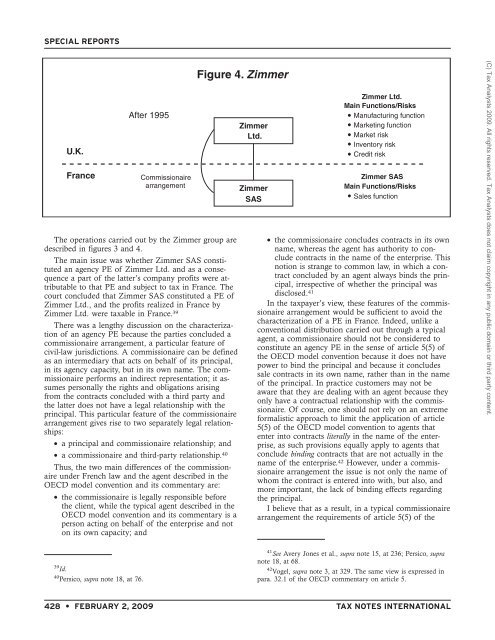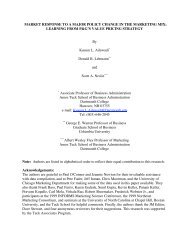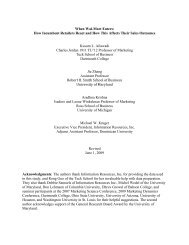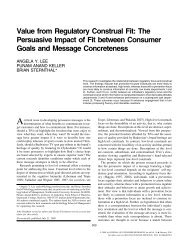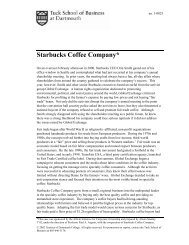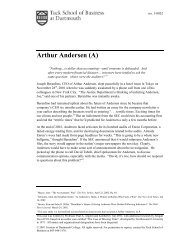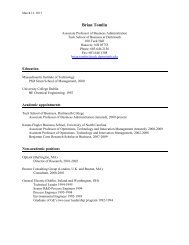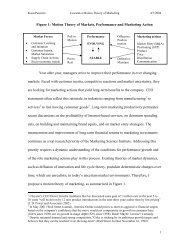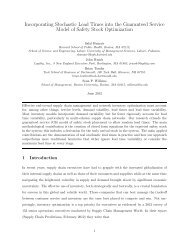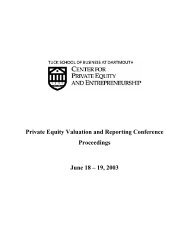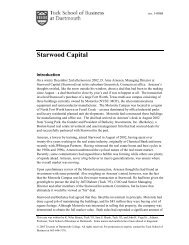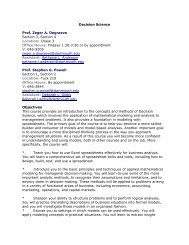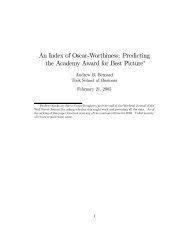tax notes international - Tuck School of Business - Dartmouth College
tax notes international - Tuck School of Business - Dartmouth College
tax notes international - Tuck School of Business - Dartmouth College
You also want an ePaper? Increase the reach of your titles
YUMPU automatically turns print PDFs into web optimized ePapers that Google loves.
SPECIAL REPORTS<br />
The operations carried out by the Zimmer group are<br />
described in figures 3 and 4.<br />
The main issue was whether Zimmer SAS constituted<br />
an agency PE <strong>of</strong> Zimmer Ltd. and as a consequence<br />
a part <strong>of</strong> the latter’s company pr<strong>of</strong>its were attributable<br />
to that PE and subject to <strong>tax</strong> in France. The<br />
court concluded that Zimmer SAS constituted a PE <strong>of</strong><br />
Zimmer Ltd., and the pr<strong>of</strong>its realized in France by<br />
Zimmer Ltd. were <strong>tax</strong>able in France. 39<br />
There was a lengthy discussion on the characterization<br />
<strong>of</strong> an agency PE because the parties concluded a<br />
commissionaire arrangement, a particular feature <strong>of</strong><br />
civil-law jurisdictions. A commissionaire can be defined<br />
as an intermediary that acts on behalf <strong>of</strong> its principal,<br />
in its agency capacity, but in its own name. The commissionaire<br />
performs an indirect representation; it assumes<br />
personally the rights and obligations arising<br />
from the contracts concluded with a third party and<br />
the latter does not have a legal relationship with the<br />
principal. This particular feature <strong>of</strong> the commissionaire<br />
arrangement gives rise to two separately legal relationships:<br />
• a principal and commissionaire relationship; and<br />
• a commissionaire and third-party relationship. 40<br />
Thus, the two main differences <strong>of</strong> the commissionaire<br />
under French law and the agent described in the<br />
OECD model convention and its commentary are:<br />
• the commissionaire is legally responsible before<br />
the client, while the typical agent described in the<br />
OECD model convention and its commentary is a<br />
person acting on behalf <strong>of</strong> the enterprise and not<br />
on its own capacity; and<br />
39 Id.<br />
U.K.<br />
France<br />
40 Persico, supra note 18, at 76.<br />
After 1995<br />
Commissionaire<br />
arrangement<br />
Figure 4. Zimmer<br />
Zimmer<br />
Ltd.<br />
Zimmer<br />
SAS<br />
Zimmer Ltd.<br />
Main Functions/Risks<br />
Manufacturing function<br />
Marketing function<br />
Market risk<br />
Inventory risk<br />
Credit risk<br />
Zimmer SAS<br />
Main Functions/Risks<br />
Sales function<br />
• the commissionaire concludes contracts in its own<br />
name, whereas the agent has authority to conclude<br />
contracts in the name <strong>of</strong> the enterprise. This<br />
notion is strange to common law, in which a contract<br />
concluded by an agent always binds the principal,<br />
irrespective <strong>of</strong> whether the principal was<br />
disclosed. 41<br />
In the <strong>tax</strong>payer’s view, these features <strong>of</strong> the commissionaire<br />
arrangement would be sufficient to avoid the<br />
characterization <strong>of</strong> a PE in France. Indeed, unlike a<br />
conventional distribution carried out through a typical<br />
agent, a commissionaire should not be considered to<br />
constitute an agency PE in the sense <strong>of</strong> article 5(5) <strong>of</strong><br />
the OECD model convention because it does not have<br />
power to bind the principal and because it concludes<br />
sale contracts in its own name, rather than in the name<br />
<strong>of</strong> the principal. In practice customers may not be<br />
aware that they are dealing with an agent because they<br />
only have a contractual relationship with the commissionaire.<br />
Of course, one should not rely on an extreme<br />
formalistic approach to limit the application <strong>of</strong> article<br />
5(5) <strong>of</strong> the OECD model convention to agents that<br />
enter into contracts literally in the name <strong>of</strong> the enterprise,<br />
as such provisions equally apply to agents that<br />
conclude binding contracts that are not actually in the<br />
name <strong>of</strong> the enterprise. 42 However, under a commissionaire<br />
arrangement the issue is not only the name <strong>of</strong><br />
whom the contract is entered into with, but also, and<br />
more important, the lack <strong>of</strong> binding effects regarding<br />
the principal.<br />
I believe that as a result, in a typical commissionaire<br />
arrangement the requirements <strong>of</strong> article 5(5) <strong>of</strong> the<br />
41<br />
See Avery Jones et al., supra note 15, at 236; Persico, supra<br />
note 18, at 68.<br />
42<br />
Vogel, supra note 3, at 329. The same view is expressed in<br />
para. 32.1 <strong>of</strong> the OECD commentary on article 5.<br />
428 • FEBRUARY 2, 2009 TAX NOTES INTERNATIONAL<br />
(C) Tax Analysts 2009. All rights reserved. Tax Analysts does not claim copyright in any public domain or third party content.


